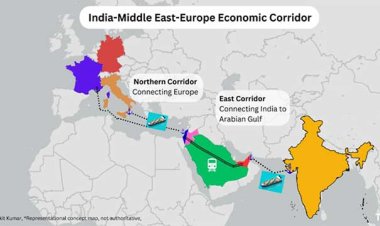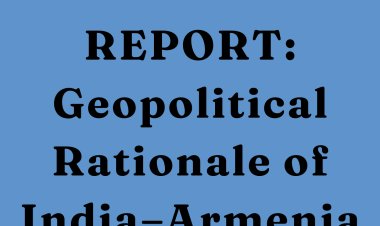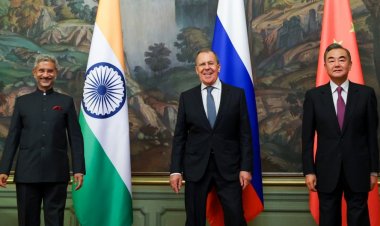Naftali Bennetts Israel : Future Trajectories and Foreign Policy Challenges (Part 1)
The following commentary looks at the potential challenges and the trajectory that Israel's foreign policy will face under the new Naftali Bennett government and how the government shall tackle these challenges and further existing diplomatic ties between Israel and its partners.

Commentary (Part one of a two-part series)
By Dr Anoop Kumar Gupta
This article is a part of a 2 part series by the author exploring the possible trajectory and challenges ahead of the new Israeli government under Naftali Bennett.
June 13, 2021— Israeli lawmakers cast their vote of confidence in Knesset (Israeli Parliament)—will be inscribed as a historic day in Israeli politics. The day witnessed the unseating of its longest-serving Prime Minister, Benjamin Netanyahu, who was till then serving for an uninterrupted twelve years at the helm of affairs. The vote installed a coalition government of parties with such divergent ideological affiliation that was so far unthinkable in Israeli politics. The current government sworn in under the leadership of Naftali Bennett, the head of the right-wing nationalist Yamina party, not only has parties drawn from the political right, centre, and left, but also a major Arab party for the first time.
Nevertheless, the widely dispersed collage of political formulations is somewhat fragile, given that it won the support of mere 60 lawmakers in the 120 member Knesset. It is noteworthy that 59 lawmakers opposed the new government, and abstention by one member from the supporting Arab Ra'am party ultimately helped Bennett's coalition sail through the floor test. The historical development has ended almost two and a half years of political impasse in Israel but at the same time has also raised serious questions regarding the survival of this loosely knitted coalition and its ability to take essential decisions on domestic and foreign policy-related challenges.
Given the razor-thin majority, the new government would have to demonstrate political maturity of the highest level making sure that all its moves are properly coordinated among its eight factions. Even beyond that, it has to evolve a consensus among all the backing lawmakers constantly. With no margin of error whatsoever and coalition partners who wouldn't see eye-to-eye on most critical issues, the government's survival would depend mainly on accommodation and consensus-building to avoid internal confrontation. Every day will be a challenge for survival as the new Israeli government walks a political tight-rope. It managed to survive one such test barely two days after its formation when Jewish nationalists carried out a flag march in Jerusalem on June 15 that passed relatively peacefully.
Coalition Agreements as Guiding Principle
According to the political tradition of Israel, coalition partners must submit their program as a guiding principle in the form of Coalition Agreements to Knesset before the vote of confidence. Yesh Atid leader Yair Lapid, who takes over Premiership on August 27, 2023, in a rotation agreement with Bennett, tried hard until the last hour deadline for signing the coalition agreements between eight parties before swearing-in of the new government. The coalition agreements as guiding principle of the new government do not delineate many foreign policy issues barring West Bank and Jewish Diaspora. Agreements have focused more or less on domestic socio-economic-religious agenda and avoided dealing with thorny issues. Coalition agreements talked about a master plan for transportation in the West Bank. It also stressed maintaining all security and civil control and enforcement against construction violations and illegal takeover of land in Area C of the West Bank under the Defense Ministry. It emphasized that the new government will promote a plan to clamp down on illegal Palestinian construction in Area C of the West Bank. The coalition agreement also stressed that parties would oppose unilateral moves vis-a-vis the Palestinians. Thus, coalition agreements signed by the different partners indicate that the new government will adopt a cautious approach towards West Bank areas of Palestinian territory.
Coalition agreements also indicate that the new government will focus on Jewish Diaspora abroad and emphasize increasing Jewish immigration to the State of Israel—particularly facilitating the immigration of all Ethiopian Jews to Israel within three years. It promised to establish a new department in the Diaspora Affairs Ministry to expand Israel's outreach with the liberal streams of Judaism abroad.
Bennett-Lapid speech and Foreign Policy Challenges
What would be the foreign policy directions of the new government in Israel? Prime Minister Naftali Bennet's speech during the vote of confidence in Knesset on June 13, and Foreign Minister/Alternate Prime Minister Yair Lapid's speech during the change of guard ceremony on the following day, projects a brief overview of the foreign policy vision of the new government. In his Knesset speech, Bennett emphasized that Israel faces significant external challenges ahead, including "the Iranian nuclear project, which is moving towards a crucial point; the ongoing war on terror; Israel's image in the world and the unfair treatment it receives in international institutions." He asserted that "these are all sizable and complex tasks." Outlining the foreign policy priority of the new government, Lapid pledged to rebuild Israel's international ties. While both Bennett and Lapid vowed to raise Israel's international standing and image and fix Israel's relations with Democrats in the United States, they asserted to continue Netanyahu's policy of opposing Iran's nuclear program and advancing Abraham Accord.
Commenting on the foreign policy directions of the new Israeli government, Israel's ambassador to Singapore, Sagi Karni, stated that "as far as foreign policy is concerned, we're about to see a continuation of previous policies of the government". However, looking at the composition of the current coalition, Israel's foreign policy will witness continuity with change under the Bennett-Lapid dispensation. Changes in Israel's foreign relations are likely to be operational rather than substantive. Survival of Israel, national security threats, economic growth, linkages with Jewish Diaspora, and increased engagement with the United States and other major global and regional players shall remain the key drivers of foreign policy formulations of the new government.
Managing Global partnership
The new Israeli government shall engage its global partners with increasing thrust, sensitivity, and energy. At this level, priority areas for the new dispensation would be its engagement with United States, Russia, China, and European Union, including the Jewish Diaspora worldwide.
Israel-U.S.
The new coalition government will witness a change in domestic policies, but it is improbable to change US-Israeli relations dramatically. US-Israel relations flourished dramatically under Donald Trump's regime, which will remain the same under the new Israeli government. US President Joe Biden unequivocally declared its "ironclad commitment to Israel's security" amid increasing pressure from the international community and the liberal democrat of his party during the fourth Israel-Hamas conflict in May 2021. However, the new dispensation shall adopt a bipartisan approach towards the US rather than the partisan reach of his predecessor. Commenting on PM Netanyahu's approach to the United States, Yair Lapid had stated that "Prime Minister Netanyahu has made the mistake of affiliating himself way too much with the Republican Party." An Israeli journalist Amir Tibon also asserted that Benjamin Netanyahu seemed to have taken a side in American politics and sometimes sought confrontation with Democrats.
Extending his thanks to US President Joe Biden for his unwavering support and longstanding commitment to the security of Israel during the fourth Israel-Gaza conflict, Bennett stressed in the Knesset that "my government will make an effort to deepen and nurture relations with our friends in both parties – bipartisan. If there are disputes, we will manage them with fundamental trust, and mutual respect." Bemoaning Netanyahu's approach, incoming Foreign Minister Yair Lapid stated that "the management of the relationship with the Democratic Party in the United States was careless and dangerous" and pledged to repair ties between Israel and 'angry' Democrats in the US. However, it is essential to note here that while the Biden administration took months to give a phone call to Benjamin Netanyahu but new Prime Minister Bennett received a call from the White House within hours. This is reflective of the Biden administration's positive approach towards the new regime in Israel.
Thus, moving away from the partisan legacy of Benjamin Netanyahu towards the US, the New Israeli government shall endeavour for a bipartisan approach towards the United States to restore solid bipartisan support for Israel's national security and economic prosperity. However, the new setup in Jerusalem has a challenging task ahead in engaging with the Joe Biden administration regarding Iran's nuclear program, negotiated peace with Palestinian, Jewish settlement in West Bank areas, the annexation of West Bank areas, and opening of US consulate in Jerusalem for Palestinians.
Israel-Russia
Neither Coalition agreement nor Naftali Bennett's speech at Knesset dealt with Israel's ties with Russia. However, the place of Russia will remain an important foreign policy priority area for the new regime. Russo-Israeli relations are crucial for any Israeli government because of a sizeable Jewish Diaspora in Russia. Russia is a dominant player in the Middle East, and it has the potential and capability to destabilize the strategic environment surrounding Israel. The new government will keenly observe the national security implications of Russia's presence in Syria, its warming politico-strategic relations with Iran, its outreach to Gulf countries, its linkages with Hamas, and its overall involvement in the Middle East. That is why the new government is likely to continue developing compartmentalized cordial relations with Russia. The new dispensation has to walk on the tight rope looking at Russia's strained relations with the United States and its politico-strategic commitment in the Middle East.
Israel-China
The new government will further cement its ties with China, one of Israel's largest trading partners. Sino-Israeli relations have been confined to the economic and technical arena since 2000—when the US administration pressured Israel to snap reconnaissance planes, Falcon Radar, deal with China—because of its security apprehensions regarding reverse engineering of US technology by China. Strains in Sino-US relations have impacted the development of the overall ambit of Sino-Israeli ties under the Donald Trump administration. Trump administration again forced Israel in 2017 to cancel the Chinese tender of upgrading Haifa port. Thus, keeping in mind the 'US factor'—the new Israeli government will face challenges in inviting Chinese investment and tenders even in core economic-technological sectors, which may have security implications. Suppose the Biden administration decides to follow Trump's legacy of containing China. In that case, it will be challenging for the new Israeli government to manage its relations with China, even in the economic and technological field.
Israel-EU
The new government is likely to boost relations with the EU within the existing cooperative framework. Foreign Minister Yair Lapid stressed that "Israel's relations with European countries had also been left in shambles, panning the outgoing government for its method of dealing with criticism." Lapid also stressed that "Our relationship with too many governments has been neglected and become hostile. Shouting that everyone is antisemitic isn't a policy or a work plan, even if it sometimes feels right."
The new government will also focus on enhancing its standing in the world community. Foreign Minister Lapid asserted that Israel's standing in the West had taken a beating under outgoing Prime Minister Benjamin Netanyahu. He further stated that in the past years, Israel has 'abandoned the international arena' and then "we woke up one morning to find that our international standing has been weakened." There has been increasing criticism of Israel regarding its handling of the Palestinian issue, mainly its targeted strikes against Hamas-led terror groups in Gaza Strips, leading to unintended civilian casualties. The new government will put forward its case against Hamas's terror activities and raised its voice against 'disgraceful propaganda' against Israel. Lapid pledged that Israel "will need to make clear to the world that we are fighting a sick terror organizationorganization that has no problem firing rockets from kindergartens and schools." Lapid stressed that "Israel has a strong story. The facts are on our side…. we are a vibrant, peace-seeking democracy that is fighting for its life against the darkest forces of terror in the world." Thus, it seems that the new government will use public diplomacy to build its image and project Israel's soft power abroad.
Emphasizing the special bond between the State of Israel and Jewish Diaspora abroad, Bennet also asserted in his speech that "we will strengthen the bond between the State of Israel, and the Jews of the Diaspora...we will fight against the wave of anti-Semitism."
Dr Anoop Kumar Gupta has been visiting researcher at the Hebrew University of Jerusalem, Israel, and an alumnus of the School of International Studies, JNU New Delhi.
Disclaimer: This paper is the author’s scholarly contribution and does not necessarily reflect the organisation’s viewpoint.
























